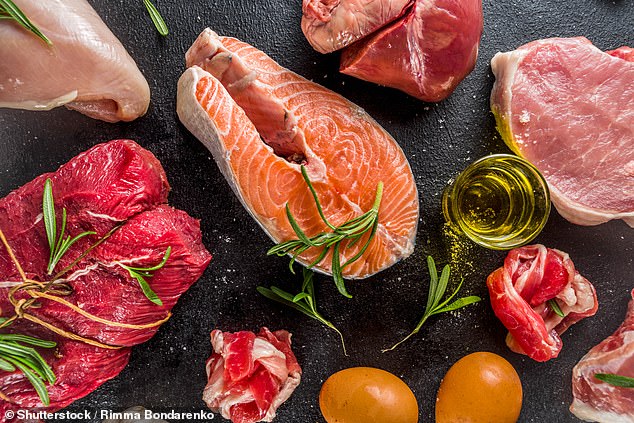It’s a question that many nutrition researchers have been debating for decades: which diet is best for weight loss?
Now, researchers at the University of Illinois have made a discovery that they believe could help provide the answer.
The scientists found that feeding the mice one of two types of protein was associated with having less body fat than a standard diet.
They also found that eating a high-protein diet can have a beneficial effect on the trillions of healthy bacteria in the gut, which have been linked to hunger and appetite control.
The study, conducted in mice, aimed to determine how high-protein diets affect the animal’s gut microbiome and body composition, including weight and total fat.
Mice fed a diet composed primarily of different types of proteins weighed less and had less fat mass. The proteins they consumed were found in most meat, eggs, and various types of fish.
The scientists carried out a month-long experiment with 16 mice. For the first two weeks of the experiment, the mice were fed a standard mouse chow diet composed primarily of carbohydrates.
Over the next two weeks, they divided them into four groups and gave them new foods that contained one of two types of proteins, which can be found in meat, poultry and seafood.
The scientists collected daily samples of the mice’s fecal matter to monitor the proportion of healthy gut bacteria, as well as measurements of their body fat.
At the end of the study period, it was revealed that mice eating high-protein diets experienced greater loss of both body weight and fat than those eating standard high-carbohydrate diets.
One type of protein stood out as having the greatest impact: branched-chain amino acids, administered to one of the groups.
Branched-chain amino acids are commonly found in chicken, beef and turkey, salmon, tuna, shrimp, and milk.
They also discovered that undigested protein fermented in the intestine, producing beneficial byproducts such as short-chain fatty acids, which help the body regulate appetite and absorb vitamins.
Previous studies have pointed out the positive effects of a high-protein diet on the gut microbiome.
Protein fermentation leads to the development of certain beneficial bacterial strains, such as lactobacillus, which can hunt and destroy harmful bacteria.
Samson Adejumo, a doctoral candidate in biology at the University of Illinois who led the research, said the findings contribute a “crucial foundation” in our understanding of how proteins influence our gut microbiome and, ultimately, our health. .
Previous studies have found that an abundant gut microbiome can increase the rate at which calories are burned and regulate hunger signals sent between the brain and stomach.
It also modulates the movement of bile in the digestive tract, which plays a role in the digestion and absorption of fats.
While the experiment was conducted on mice, other research concluded that increasing the amount of protein from food in the diet promotes muscle tone, growth, and strength.
Protein should make up 10 to 35 percent of daily calories, and athletes should consume one to two grams per kilogram of body weight, official guidelines recommend.


